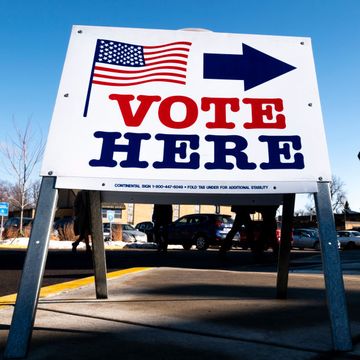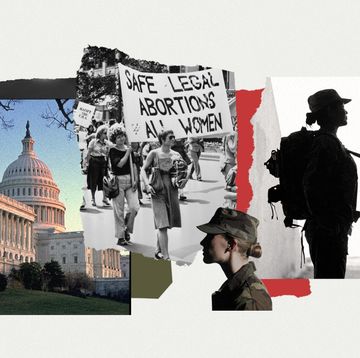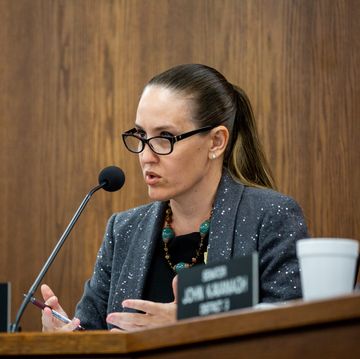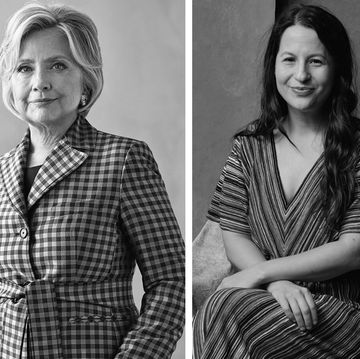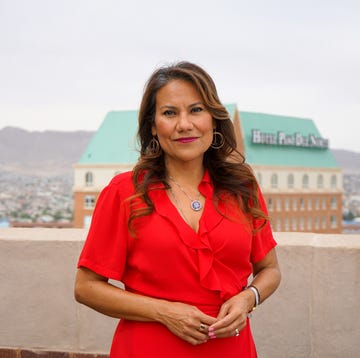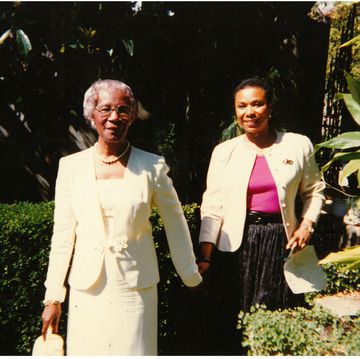In the predawn dark on the day she was to be sworn in to Congress, Kyrsten Sinema laced up her running shoes. It was an icy 30 degrees, but there was no question that the Arizona native was going to run. Sinema runs every day. And her running group from back home—the five women who are her best friends, her sounding board, and her informal political consultants—was there. As the sun came up, the women stopped for a breather on the steps of the Lincoln Memorial and looked out over the National Mall. Some of them took cell-phone photos. Others teared up. Sinema, always the chatty one, kept repeating, "I can't believe this, I can't believe this."
There's much about Sinema's story that seems unbelievable. Only 36 years old, she's a member of the U.S. House of Representatives who also has a master's degree, a PhD, and a law degree. She's never been married, is openly bisexual, and claims no religion—definitely an idiosyncratic bio for a national politician. At a time when the gap between rich and poor in America has never been wider, Sinema, who was homeless for a time as a child, crosses economic divides as well as political ones. Although a staunch Democrat, she was a productive member of the conservative Arizona state legislature, where she served for seven years, and has written a book, Unite and Conquer, about how to build broad coalitions to promote progressive policies; she was elected to Congress in a newly created district that has more Republican voters than Democrat. (Not that her opponent in that race didn't try to pigeonhole her: Republican Vernon Parker ran ads of Sinema in a Photoshopped Janis Joplin outfit under the heading radical left-wing activist.)
Sinema wasn't the only bright young thing to report to the Capitol in January. The 2012 election, dubbed another "Year of the Woman" by some political observers (when it's the "Year of the Man," we ladies will finally know we've made it), more than doubled the size of the female under-40 contingent, from two to five. Joining Sinema are Hawaii's Tulsi Gabbard, a 32-year-old combat veteran who's also the first Hindu rep, and Grace Meng, a 37-year-old Asian-American lawyer from Queens, New York. This is a new generation that's just starting to come of age politically—one that has the potential to rewrite some of the long-standing rules for women in politics.
As I walk into Sinema's office on Capitol Hill—she's been on the job for about 10 weeks—it strikes me that she's even more of a rare species than I thought: an exotic parrot in a town of dark-feathered wrens. She's wearing a full-skirted dress splashed with plum-colored flowers; her eyeglass frames are magenta, the water bottle from which she sips between meetings is fuchsia. (Sinema, the proud owner of more than 100 pairs of shoes, was declared best-dressed politician by an Arizona newspaper for four years running.)
"One of the reasons I ran for office in the state legislature," Sinema tells me between meetings with representatives of the Veterans of Foreign Wars and YMCA, "was to help people. Now I have 13 staff and 10 interns. If people call our office, they're going to get help." That sounds like a political banality, but Sinema was a social worker before she was a politician, and when she asks visitors, "How can I help?" you actually believe she intends to. Not to mention that given her freshman status, she's not high enough in the party hierarchy to accomplish much more. She has been named to the Democrats' whip team, which was a bit of a coup, but even Hillary Clinton pretty much kept her head down and her goals local during her first year or two in the Senate. It may be especially important for Sinema to focus in on her 360,000 constituents for another reason: As a freshman incumbent who won by a narrow margin in 2012, she is already showing up on lists of vulnerable seats.
With Sinema's day sliced into 15-minute blocks, her scheduler is a constant specter at the door, popping in to remind the congresswoman (though she insists her staff dispense with the honorific dictated by DC tradition and merely call her Kyrsten) that she's got to wrap up because four more groups are crowded outside her office. After each meeting, Sinema shakes every hand in the room, straightens her posture for a quick photo op, then welcomes the next set of earnest pleaders. By all appearances, she is that superwoman we've all met once or twice, the person who's actually doing the things we say we want to get around to, like training for an Ironman triathlon or reading books about physics or the brain. She's "like a workaholic times 10," says David Lujan, a Democrat who served in the Arizona legislature with her for six years. Sinema wakes at 5 a.m. to run (often with a few U.S. Marines) and doesn't get home till 10 p.m. Weekends are spent in Phoenix, training for marathons and holding Congress on your Corner events to chat with constituents.
Women in previous generations tended to get into politics because a specific issue angered them, says Jessica Grounds, chair of the board of the DC-based Women Under Forty Political Action Committee (WUFPAC), one of Sinema's early supporters. Younger women, meanwhile, seem to be running because they believe that they're "the best person to make legislation and be a leader," Grounds says. She pegs the shift to a larger pool of female role models and the post–Title IX environment, in which competitive behavior is more accepted in women. "The younger female candidates we work with are definitely much more ambitious," she says.
Sinema doesn't like the A-word. "When a man is ambitious, they use hard-working, smart. That's unfortunate, because the word means you're working hard and want to accomplish stuff." (Not exactly: Men are called ambitious all the time—it's just that the word is usually meant as a compliment.) But if Sinema isn't ambitious, no one is. She was born in Tucson, Arizona, to middle-class Mormon parents. Her dad was an attorney, and her mother stayed at home with Kyrsten and her older brother and younger sister. When she was eight, her parents divorced and her mother married a teacher. After the family moved to a small town in the Florida Panhandle, her stepfather lost his job, and their finances collapsed. They took up residence in an abandoned gas station. This became the defining experience of her life, she says, her motivation for becoming a social worker and, later, a politician.
"I was old enough to know something was wrong," Sinema says. "We didn't have electricity. My stepdad built a bunk bed for me and my sister. We separated our bunk bed from the kitchen with one of those big chalkboards on rollers. I knew that was weird. A chalkboard shouldn't be a wall. A kitchen should have running water. We didn't have a toilet." She wore hand-me-downs from a girl at church. They ate "welfare food" ("what you get when you don't have money to buy regular food") such as powdered eggs. After two years, her stepdad found a job and the family moved into a real house, but they were never middle-class again. Despite these obstacles, Sinema graduated from high school at 16 and, with the help of scholarships and a Pell grant, enrolled at Brigham Young University, earning a bachelor's degree in social work in just two years. Around this time, she broke with Mormonism. She has since publicly criticized faith groups' intervention in politics—"I don't think Arizonans are interested in having the Mormon religion dictate public policy to them," she said in 2008, when Arizona was battling over the legal definition of marriage—but she seems to take pains not to utter a bad word about her own upbringing. "My parents are very conservative," she says, adding quickly, "they taught me the value of hard work—don't depend on other people, do it yourself."
Neither her mother nor father attended her congressional swearing in, and while one of her running friends, Dana Kennedy, told me that Sinema's attitude to their absence was her usual, "I'm okay, I'm okay, I'm okay," she grew visibly uncomfortable when an interviewer from Current TV asked her a year ago whether her parents embraced their openly bisexual daughter. "I'm the first person in my family to ever hold elected office," she said. "I think the entire Sinema clan is happy." I think. When I ask if she spends Christmas with her family, she replies, "On most holidays you'll find me in Mexico. Actually, on most holidays you won't find me. I'm at a beach, and it's wonderful."
Determined to help poor children, Sinema got a master's degree in social work at Arizona State University in 1999, and then took a job as a social worker in a low-income elementary school in Phoenix. She converted the former girls' locker room into a family resource center; her office was in the gym, and the showers were used as a clothing bank. But she quickly realized that these efforts were just stopgaps and started looking for big-picture ways to fix them.
In 2000, her school district's budget was on the chopping block, and her fellow social workers nominated her to go to the state capitol to fight the cuts. As she walked into the building, she says, "I was scared I wasn't knowledgeable enough." But once she started talking to legislators, "I realized I was way overeducated. I had the skill level. And I realized there weren't people like me inside the building. At that moment, I decided to run for office."
Sinema's first attempt at the state legislature—while she was in law school—was a failure. "I was not a Democrat; I was an independent," she says. "Here's the thing: You can't win that way. But I didn't know that." Undeterred, Sinema reregistered as a Democrat, and the next election she won. At 28, she was Arizona's youngest lawmaker; she took the bar exam her first month in office.
In one of the more conservative statehouses in the country, Sinema was ready, as she puts it, "to face off for justice." Bills she considered "travesties"—such as draconian immigration laws and abortion restrictions—would pass with supermajorities, despite her fiery floor speeches. When legislation was pending to ban women from selling their eggs, Sinema took to the floor to say, "You keep your hands off my eggs, and I'll keep my hands off your sperm."
"When she first came in, she'd just kind of say how she felt," Lujan says. "But at times that hindered her ability to accomplish things." Sinema realized, she says, that she'd worked herself into a "lonely corner." She softened her tone and started joking around with members of the opposite party. But she stuck to her progressive beliefs, racking up awards from such groups as Planned Parenthood and the Sierra Club. Sinema marched for immigrants' rights, and when undocumented students couldn't afford a permit to hold a public rally for the DREAM Act, she put up her own cash to help them. In her spare time, she returned to ASU to earn her PhD in social work, adding "Dr." to her growing list of titles.
Sinema first started getting national attention in 2008, when she led a diverse coalition that defeated a ballot initiative that would have outlawed gay marriage. She drew some ire from the gay-rights community for appealing to heterosexual voters who weren't naturally sympathetic to the cause by stressing that the ban would curtail the rights of all unmarried couples, but the strategy apparently worked: It was the first time that American voters rejected an antigay measure.
Although Sinema says she's "always been out," her first public comment as an elected official came in 2005, after a Republican colleague's speech insulted LGBT people. "We're simply people like everyone else who want and deserve respect," she passionately declared. Later, when reporters asked about her use of the first person, Sinema replied, "Duh, I'm bisexual."
"Duh, I'm bisexual"—think about that. It was only four years ago that the first openly gay person was elected to Congress, Colorado Democrat Jared Polis. (Politicians such as Barney Frank and Gerry Studds were reelected after being outed, but Polis was the first nonincumbent.) The 2012 election also saw a lesbian elected to the Senate, Tammy Baldwin; since 2010 the nation's fourth-largest city, Houston, has had a gay mayor, Annise Parker; and its first-largest city may not be far behind, with Christine Quinn currently leading the pack of New York City mayoral candidates.
Sinema's offhand acknowledgement of her bisexuality and voters' acceptance of it can seem unbelievable to older generations. But her views about sexuality are right in step with her contemporaries': 73 percent of Americans between 18 and 29 say they support gay marriage, as opposed to only 39 percent of those older than 65. Sinema fits squarely into her demo in other ways: She's highly educated (more than a third of Gen-Xers have college degrees, compared with only a quarter of baby boomers) and, in her midthirties, she remains single and childless.
With their more laissez-faire attitudes toward family structure and sexual preferences (and well-publicized distaste for being "labeled"), Sinema and her generation could perhaps lead us to a time when private lives—whom we sleep with, whether we're parents, or whether the primary breadwinner is the husband or wife—don't determine how voters cast their ballots. But the culture isn't quite there yet, and Sinema, understandably, can sometimes seem trapped between the old and new worlds.
"I don't have a story to tell. I don't think this is relevant," she snapped to a Washington Post reporter who, after pressing her on her sexuality in January, wrote that, when it came to this subject, she turned "lecturing, hectoring, defensive, accusatory, pouty, and curiously repetitive." When I ask about her personal life—as a U.S. congresswoman, is it tough to get a date? Does she want children someday?—she answers, "I don't really think that's any of your business. Not a lot of people ask young men in politics."
That's only half true. Politicians' dating lives tend to be public fodder. A blog for the Post profiled "bachelor congressmen" in 2011, and in 2009 Time asked unmarried Republican Rep. Aaron Schock if he was dating anyone. ("Not yet," he replied. "Put out the word!") Schock, a social conservative, has repeatedly denied rumors that he's gay but seems at ease talking about the single life, joking with Details, "There's no line of young ladies at my door every morning."
The kid question, however, is often reserved for women. And earlier generations of female lawmakers explicitly campaigned on their commitment to family—Patty Murray ran for Senate as "just a mom in tennis shoes," and Nancy Pelosi was sworn in as Speaker of the House surrounded by her grandkids. Sinema, meanwhile, got herself into some trouble when she made what she thought was an obviously satirical comment about stay-at-home mothers, but then found that her words were trotted out and portrayed as sincere by her congressional opponent six years later.
"It's an emerging reality," says Grounds, the WUFPAC board chair. "A lot of the young women in our professional world are single well into their thirties. But there is a unique credibility challenge there. How do you be authentic with yourself?" You're going to be asked about your personal life, she tells young politicians; what matters is how you answer, and how you turn the conversation back to the issues.
In her congressional primary, in fact, Sinema charged that one of her two opponents (both married men in their thirties with young kids) told potential donors that her LGBT/single-white-female status would doom her in the general election. It didn't, of course, but while Sinema has grown adept at emphasizing certain parts of her story, she probably would be well served to come up with a more thoughtful way to discuss the aspects of her life that she wishes everyone would just take for granted. "My sexuality was never a problem at the state level," she says, a bit wistfully.
By starting so young, however, Sinema has time to learn—and, at her best, charisma to burn. A regular guest on MSNBC, she has discussed health care and immigration on the Melissa Harris-Perry Show and the federal budget on Up With Chris Hayes. "You have a very winning personality," Hayes told her recently. "Can you, by force of your personality, bring the Republican caucus over?" (Hey, she's not a magician.) Sinema says she doesn't have a 10- or 20-year plan, or specific ambitions for higher office. Yet politicians who begin their careers early often have the best shot at rising to the top: 12 of the last 18 presidents kicked off their political careers before age 35. Sinema is part of the first generation of women to follow that timetable, and at 36 has already been in public office for almost a decade. Consider this: At her age, Nancy Pelosi was 11 years away from winning her first election, Hillary Clinton 17.
Liked this story? Get it first when you subscribe to ELLE magazine.



